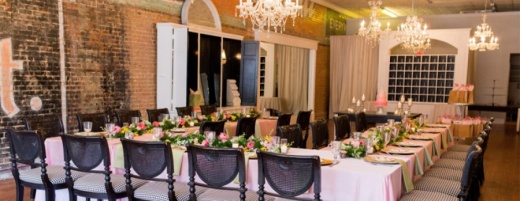While restaurants are allowed to operate at 50% capacity, wedding venues in McKinney and throughout Texas are restricted to the initial 25% occupancy Abbott announced at the start of May due to the coronavirus pandemic.
“People that are touring are not booking because of the uncertainty,” said Jennifer Klassen, owner and event manager of Gather in downtown McKinney. “People say, ‘Gosh, I really want to have 100 people at my wedding.’ Well, at 50%, we could do that. Most venues could do that easily. But at 25%? You've just cut the legs out of the industry.”
Gather can usually host about 200 people, Klassen said. But at 25% occupancy, having only 50 guests is too few for most events, she said.
“When their original wedding was 150 people, they just don’t want 50 people,” she said. “Which, I get—like, you’re going to have to work us a little bit, but it’s a lot easier to cut 50 people as opposed to 100 people,” said Klassen’s daughter, Crystal Jansa, who also operates Gather.
In addition, venues are also required to have no more than six people per table, and the tables have to be six feet apart, according to reopening safety guidelines, Jansa said.
“Some venues can't even get to 25% because of the way the tables have to be arranged,” Jansa said.
Wedding venues were not initially included during Abbott’s April 27 announcements regarding some businesses and restaurants reopening at 25%, Klassen said. They had to wait until Abbott’s May 5 announcement to reopen at that percentage but were allowed to reopen immediately.
That did not stop Klassen and other wedding industry business owners from hoping that venues would be allowed to operate at 50% starting May 22 along with Texas restaurants, she said.
But that announcement never came.
“I know for Gather, all of my July and August events except one would go off without a hitch safely practicing social distancing at 50% occupancy because of what their head counts came in at,” she said. “These head counts were set months ago, and ... holding us hostage to 25% took away all that hope.”
Wendy Kidd, owner of Each and Every Detail, a McKinney event planning service, said many small businesses depend on weddings and other events to survive—from DJs to photographers and bakers. These businesses are also being hurt when venues are restricted, she said.
“If they are going to continue to limit events, the wedding industry is going to be crushed, quite honestly, because we don't have any additional government funding as of right now,” Kidd said. “And our confidence—our clients’ confidence—in locating new events is gone because they have no idea when is a safe date to plan for an event.”
Mark Herrera, director of education and life safety for the International Association of Venue Managers, said he understands there is an economic impact that comes with the statewide occupancy limitations, but he emphasized the point that people's health needs to be the first priority.
"We've got to use caution when we open up these facilities and make sure that we're not the facility that makes a bad decision," he said.
Even if venues are allowed to operate at 50% capacity, he recommended taking a more cautious approach and following all governing regulations and safety guidelines from the Centers for Disease Control and Prevention.
"It's truly unknown if 50% is a good number to gauge a mass gathering under the current conditions," he said. "There's no guarantee that 50% is the magical number."
Kidd and Klassen both said they have reached out to the office of the governor asking for change.
If nothing is changed soon, venues will have nothing else to do but hope for more funding, Klassen said. In the meantime, she is continuing to ask not just for 50% occupancy but to be treated the same as Texas restaurants.
“It’s not enough [to be at 25%],” she said. “The fact is, people come together and they interact at a restaurant just like they do at a wedding, and I would just like to be treated equally because of that. We're not asking for special treatment. We're just asking for the same treatment.”





